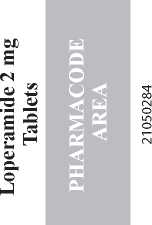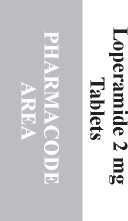Loperamide 2 Mg Tablets

Package leaflet: Information for the user Loperamide 2 mg Tablets
loperamide hydrochloride
Read all of this leaflet carefully before you start taking this medicine because it contains important information for you.
Always take this medicine exactly as described in this leaflet or as your doctor or pharmacist lias told you.
- Keep this leaflet. You may need to read it again.
- Ask your pharmacist if you need more information or advice.
- If you get any side effects talk to your doctor or pharmacist. This includes any possible side effects not listed in this leaflet. See section 4.
- You must talk to a doctor if you do not feel better or if you feel worse.
What is in this leaflet
1. What Loperamide Tablet is and it is used for
2. What you need to know before you use Loperamide Tablets
3. How to use Loperamide Tablets
4. Possible side effects
5. How to store Loperamide Tablets
6. Contents of the pack and other information
1. What Loperamide Tablet is and it is used for
Loperamide hydrochloride is the active ingredient of Loperamide Tablets. The tablets are available in one strength.
Loperamide is one of a group of medicines called "antidiar-rhoeals" which are used to treat diarrhoea.
Loperamide Tablets are used to treat sudden short-lived (acute) attacks of diarrhoea in adults and children aged 12 years and over.
It can also be used to treat diarrhoea associated with Irritable Bowel Syndrome (IBS) in adults aged 18 years and over after your doctor has diagnosed you are suffering from this condition.
The tablets help reduce diarrhoea by slowing down an overactive bowel, which helps the body to absorb water and salts from this organ, making the stools more solid and less frequent.
What you need to know before you use Loperamide Tablets
Do not use Loperamide Tablets
- if you are allergic (hypersensitive) to loperamide hydrochloride or any other ingredient of this medicine (listed in section 6)
- if you have severe diarrhoea after taking antibiotics
- if you are having a flare up of an inflammatory bowel condition like ulcerative colitis
- if you are constipated or your stomach appears swollen
(particularly in children with severe dehydration)
- if you have acute dysentery, the symptoms of which may include blood in your stools and a high temperature.
Do not give this medicine to a child under 12 years old. Do not use this medicine if any of the above applies to you. If you are not sure, talk to your doctor or pharmacist before taking Loperamide Tablets.
Warnings and precautions
Talk to your doctor or pharmacist before taking Loperamide Tablets
- if you have AIDS and your stomach becomes swollen,
stop taking the tablets immediately and contact your doctor
- if you suffer from liver problems
- This medicine only treat the symptoms of diarrhoea. In
some cases, the cause of your diarrhoea may require treatment, if symptoms persist or w orsen, please contact your doctor.
- if you have severe diarrhoea as your body loses more fluid, sugars and salts than nonnal.
- if you have diarrhoea that lasts for more than 48 hours.
If you are unsure about any of the medicines you are taking, show the bottle or pack to your phannacist.
Special warnings:
- Loperamide only treats the symptoms of diarrhoea.
When you have diarrhoea, your body can lose large amounts of fluids and salts. You will need to replace the fluid by drinking more liquid than usual. Ask your phannacist about special powders (known as oral rehydration therapy) which replace fluids and salts lost during dianhoea. The prevention of fluid depletion (dehydration) is of particular importance in infants, children and frail and elderly people with acute diarrhoea.
- You can use Loperamide for dianhoea associated with IBS which has been diagnosed by your doctor. If your symptoms change or you are concerned about anything you should talk to your doctor.
- If your IBS related dianhoea continues for longer than 2 weeks you should talk to your doctor.
Special warnings about use in Irritable Bowel Syndrome (IBS)
If any of the following apply, do not use the product without first consulting your doctor, even if you know you have IBS:
- If you are aged 40 or over and it is some time since your last IBS attack.
- If you are aged 40 or over and your IBS symptoms are different this time.
- if you have recently passed blood from the bowel
- if you suffer from severe constipation
- if you are feeling sick or vomiting
- if you have lost your appetite or lost weight
- if you have difficulty or pain passing urine
- if you have a fever
- if you have recently travelled abroad
- you can use this medicine for up to 2 weeks for repeated attacks, but if any one attack lasts continuously for longer than 48 hours, talk to your doctor.
Consult your doctor if you develop new symptoms, if your symptoms worsen, or your symptoms have not improved over two weeks.
Other medicines and Loperamide Tablets
Tell your doctor or phannacist if you are taking or have recently taken any other medicines, including medicines obtained without a prescription.
In particular, tell your doctor or phannacist if you are taking any of the following:
- ritonavir (used to treat HIV)
quinidine (used to treat abnormal heart rhythms or malaria) itraconazole, ketoconazole (used to treat fungal infections) gemfibrozil (used to reduce levels of cholesterol)
- oral desmopressin (used to treat excessive urination)
- other drags that slow down or speed up movement in the gut
Pregnancy and breast-feeding
If you are pregnant or breast-feeding, think you may be pregnant or are planning to have a baby, ask your doctor r phannacist for advice before taking this medicine.
Do not take this medicine if you are breast-feeding as small amounts may get into your milk. Talk to your doctor about suitable treatment.
Driving and using machines
Do not drive if you feel dizzy, tired or sleepy after taking this medicine. You may also lose consciousness, feel faint or less alert. If affected do not drive or operate machinery.
Loperamide Tablets contains lactose
If you have been told by your doctor that you have an intolerance to some sugars, contact your doctor before taking this medicinal product.


Cipla

Cipla Inventory Code
Date : 14-09-15
3. How to use Loperamide Tablets
Always take this medicine exactly as your doctor has told you. You should check with your doctor or phannacist if you are not sure.
- Take this medicine by mouth.
- The score line is only there to help you break the tablet if you have difficulty swallowing it whole.
- Do not take more than 8 tablets in any 24 hour period.
- This medicine should not be given to children under 12 years old. Other phannaceutical fonns/strengths (e.g. syrup) are available for children aged 4 years and over.
Short-lived (acute 1 diarrhoea
Adults and children 12 years and over:
- T ake two tablets initially, followed by one tablet
after each loose bowel movement.
- If symptoms persist for more than 24 hours, talk to your doctor
Diarrhoea associated with Irritable Bowel Syndrome already diagnosed bv a doctor
Adults aged 18 years and over:
- T ake two tablets initially, followed if required, by
one tablet after every further loose bowel movement depending on the severity of your symptoms, or as advised previously by your doctor.
- If your symptoms change, or if your diarrhoea persists for more than 2 weeks, talk to your doctor.
If you take more Loperamide Tablets than you should If you have accidentally taken more than your prescribed dose, contact your nearest hospital casualty department or tell your doctor or phannacist immediately. Remember to take the pack and any remaining tablets with you. Signs and symptoms of over dosage may include constipation, abnonnal coordination, stunned state in which it is difficult to get a response or the attention of the subject, sleepiness, breathing problem, difficulty emptying the bladder and increased tightness of muscle tone.
If you forget to take Loperamide Tablets
- You should only take this medicine as required following the dosage instructions above carefully.
- If you forget to take a dose, take a dose after the next loose stool (bowel movement).
- Do not take a double dose to make up for a forgotten dose.
If you have any further questions on the use of this product, ask your doctor or phannacist.
4. Possible side effects
Like all medicines, this medicine can cause side effects, although not everybody gets them.
If you experience any of the following, stop using the medicine and seek immediate medical help:
- Sudden swelling of the face lips, or throat, hives (also known as nettle rash or urticaria). Severe irritation, reddening or blistering of your the skin. These may be signs of a severe allergic reaction
- Blistering of your skin, mouth, eyes or genitals
- Stomach pain or severe swollen stomach
- Severe constipation
- Loss of consciousness or reduced level of consciousness (feeling faint)
Common side effects (may affect up to 1 in 10 people)
- Headache
- Feeling sick (nausea)
- Constipation
- Wind
Uncommon side effects (may affect up to 1 in 100 people)
- Feeling sleepy or drowsy
- Dry mouth
- Feeling dizzy
- Being sick (vomiting), indigestion (dyspepsia)
- Rash
Rare side effects (affects fewer than 1 in 1000 patients)
- Tiny pupils
- Itchy skin
- Difficulty passing water
- Feeling tired
- Problems with co-ordination
- Unusually stiff muscles causing poor control of movement
- Burning, tingling mouth (glossodynia)
Some of the listed side effects may be due to the diarrhoea, such as discomfort around the middle, feeling sick or being sick, dry mouth, feeling tired, drowsy or dizzy and wind. Reporting of side effects
If you get any side effects, talk to your doctor, phannacist or nurse. This includes any possible side effects not listed in this leaflet. You can also report side effects directly via the Yellow Card Scheme at: www.mlua.gov.uk/yellowcard By reporting side effects you can help provide more infonnation on the safety of this medicine
5. How to store Loperamide Tablets
Keep this medicine out of the sight and reach of children.
Do not use this medicine after the expiry date which is stated on the label or carton after 'EXP'. The expiry date refers to the last day of that month.
Store in the original package.
If the tablets become discoloured or show any other signs of deterioration, consult your phannacist who will tell you what to do.
Do not throw away any medicines via wastewater or household waste. Ask your phannacist how to throw away medicines you no longer use. These measures will help protect the enviromnent.
6. Contents of the pack and other information
What Loperamide Tablets contains
The active substance is loperamide hydrochloride. Each tablet contains 2 mg loperamide hydrochloride.
The other ingredients are maize starch, lactose monohydrate, povidone (K-30), Brilliant Blue FCF (E133), quinoine yellow (E104), magnesium stearate, talc, colloidal anhydrous silica and sodium starch glycolate and purified water.
What Loperamide Tablets looks like and contents of the pack
Loperamide Tablets are light green coloured capsule shaped, biconvex uncoated tablets with ‘2’debossed on one side and scoreline on other side.
The score line is only to facilitate breaking for ease of swallowing and not to divide into equal doses Loperamide is presented in a blister pack of 6 tablets. Marketing Authorisation Holder:
Cipla (EU) Limited, Hillbrow House,
Hillbrow Road, Esher, Surrey, KT10 9NW,
United Kingdom.
Manufacturer:
Cipla (EU) Limited,
4th Floor, 1 Kingdom Street,
London, W2 6BY, United Kingdom
This leaflet was last revised in 09/2015
Font :Times New Roman Bodytext: 10pt Heading text: 1 Opt Main Heading text: 15pt